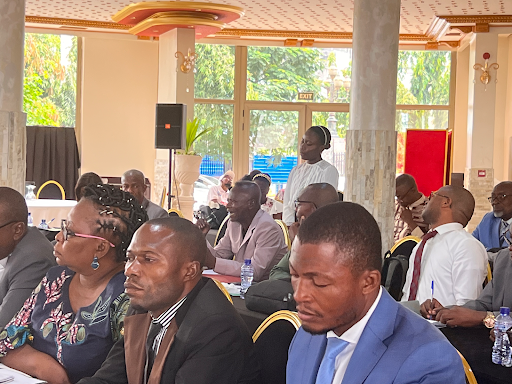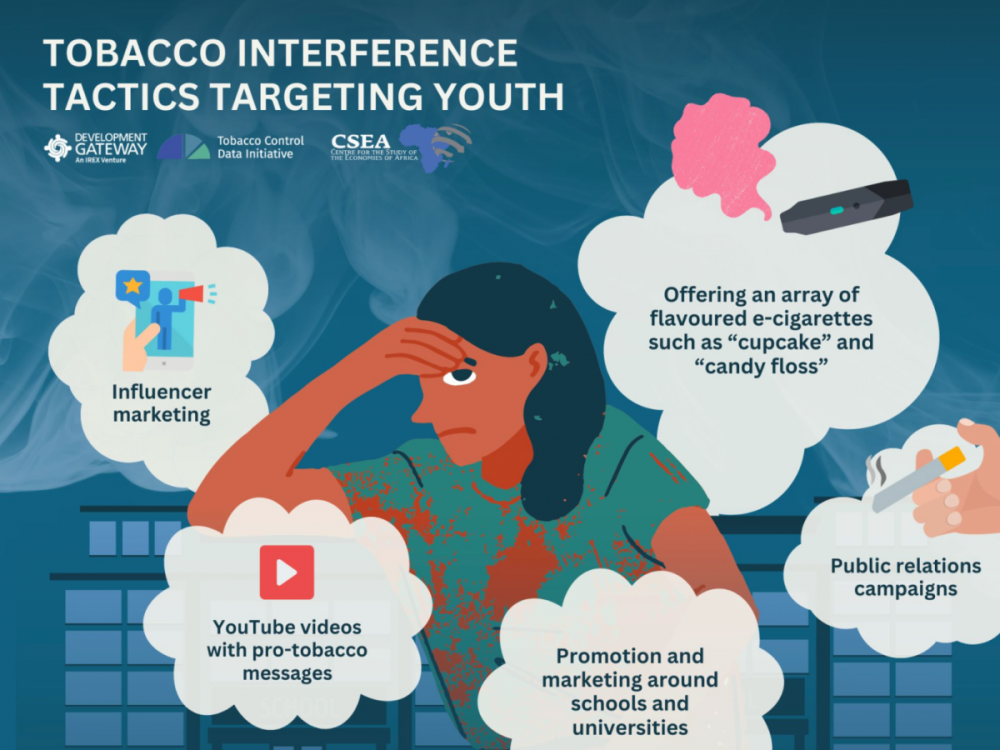Advancing Tobacco Control in Ethiopia: The TCDI Website
Beginning in 2021, Development Gateway: An IREX Venture (DG) started creating the Tobacco Control Data Initiative (TCDI) Ethiopia website (ethiopia.tobaccocontroldata.org) in partnership with Ethiopian Food and Drug Authority (EFDA). Launching in Addis Ababa, Ethiopia on February 28, the website is a “one-stop shop” to access the relevant data that Ethiopia’s policymakers need to advance tobacco control legislation and is one of several country-specific platforms DG designed in collaboration with University of Cape Town’s Research Unit on the Economics of Excisable Products (REEP).
In addition to Ethiopia’s website, TCDI country websites exist for South Africa, Zambia, Nigeria and will soon launch for Kenya and the Democratic Republic of the Congo; all were developed as part of the TCDI Program that DG implements and which is supported in partnership with the Bill & Melinda Gates Foundation.
Each country-specific TCDI website addresses barriers to data use in tobacco control by consolidating available and trusted tobacco control data, identifying and filling data gaps, and creating an online resource for policymakers to access the relevant data needed to pass and monitor tobacco control legislation. Specifically, the TCDI Ethiopia website was created in response to the impending threat of tobacco use in Ethiopia and the various dangers that accompany it.
Why TCDI?
Tobacco use in Ethiopia is relatively low compared to nearby countries; however, 259 men and 65 women in Ethiopia die per week as a result of tobacco-related issues, totaling 16,800 people per year (Naghavi, M, et al. 2017). While tobacco consumption is decreasing throughout the world, the largest increase of smokers is expected to occur in Africa (Africa’s Tobacco Epidemic, TobaccoTactics, 2021). This is particularly alarming in Ethiopia because: cigarettes are still affordable; in general, incomes are rising in Africa; the country has a large youth population; and interference by the tobacco industry in adoption and implementation of tobacco control policies is present in Ethiopia. There is also limited awareness around the negative effects of tobacco use, and approximately 3.4 million Ethiopians over the age of 15 use tobacco products (2016 Global Adult Tobacco Survey). Although Ethiopia has one of the strongest tobacco control laws in Africa, it needs to be consistently enforced. Therefore, increased awareness of tobacco harm as well as consistent enforcement of tobacco control policies are needed to ensure that smoking rates do not increase.
Through their research, the TCDI team identified common themes in the data landscape. These relate to concerns about the enforcement of existing tobacco control laws; data gaps relating to illicit trade in tobacco products; the economic and health burden of tobacco use; the prevalence of tobacco use; tobacco agriculture; and tobacco taxation. As a result, the TCDI team understands the data needs and gaps, has identified existing data, and developed the TCDI Ethiopia website that enables decision-makers to use essential data to inform tobacco control policy more effectively.
The TCDI Ethiopia Website
The TCDI Ethiopia website (ethiopia.tobaccocontroldata.org) equips stakeholders in government, civil society, academia, and the general public with the most recent reliable evidence to promote tobacco control and public health. It draws on both primary and secondary data sources and presents tobacco control information in user-friendly formats such as graphs, infographics, myths and facts, and success stories. The website will feature seven themes: tobacco prevalence, tobacco harm, illicit trade, taxation, industry interference, enforcement of tobacco control laws, and tobacco cessation. The website will be updated with new information as this becomes available over the course of the program.
Collecting Primary Data
Out of these seven themes, the page on enforcement of tobacco control laws will mainly be based on primary data. In December 2022, an observational study led by the Addis Ababa University School of Public Health was carried out to evaluate compliance with Tobacco Advertising Promotion and Sponsorship (TAPS) bans at point-of-sale and smoke-free regulations in hospitality establishments in 10 Ethiopian cities (Addis Ababa, Adama, Assosa, Bahir Dar, Dire Dawa, Gambella, Harar, Hawassa, Jigjiga, and Semera). Using standardized data collection tools, trained data collectors observed 1,468 points-of-sale (i.e., supermarkets, khat shops, merchandise stores, minimarkets, regular shops, permanent kiosks, street vendors, and food and drink wholesalers) and 1,378 hospitality venues (i.e., hotels, restaurants, bars, bars and restaurants, café and restaurants, butcher houses and restaurants, groceries, and nightclubs/lounges). Moreover, the concentrations of PM 2.5 in 144 hospitality venues in Addis Ababa were assessed to measure the air quality. In order to examine the facilitators and barriers to implementation of the tobacco control legislation, 41 in-depth interviews with relevant tobacco control stakeholders who work on policy-making and/or program implementation at the national and/or sub-national levels were also undertaken.
The study team is currently working on data analysis and report writing, the findings will be disseminated in March 2023 and incorporated into the dashboard in due course. The results of this study will give decision-makers information about the level of compliance with tobacco control measures. The findings of this study will also be used by the Ethiopian Government to improve implementation and enforcement of tobacco control laws.
The Development Process
Before creating the TCDI Ethiopia website, the TCDI team assessed the existing data and stakeholder needs through hour-long interviews with key members of the tobacco control community. The learnings from the assessment were validated with stakeholders during a workshop on June 4, 2021 before technical development proceeded. The website was created through an agile, co-design process in close consultation with key tobacco control stakeholders in Ethiopia, including Ethiopian Food and Drug Authority. (Find the full list of our stakeholders and partners here.) Initial mockups and website designs were shared with stakeholders for their input and suggestions. As a final step before launching the site, user feedback sessions were led in November 2022 and January 2023.
Ethiopian Food and Drug Authority
Ethiopian Food and Drug Authority (EFDA) is a public organization responsible for protecting and promoting public health by ensuring the quality, safety, effectiveness, and proper use of regulated products through licensing, inspection, registration, laboratory testing, post-marketing surveillance, community participation, and provision of up-to-date regulatory information. It is an autonomous federal government office, established by Ethiopia’s House of Peoples’ Representative through proclamation no. 1263/2021 with its head office in Addis Ababa.
EFDA is accountable to the Ministry of Health. It is responsible for regulating the manufacture, import, export, distribution, use, content, information disclosure, packaging and labeling with health warnings, advertisement, promotion, and sponsorship of tobacco products. It is also legally mandated as a focal office for coordination of the multi-sectoral implementation of the Framework Convention on Tobacco Control (FCTC) by different stakeholders through the development and mainstreaming of a multi-sectoral strategic plan, including implementation, monitoring, and evaluation jointly with different stakeholders. It also serves as an information center for tobacco-related information needs. EFDA generates and collects evidence on grave consequences of tobacco use as well as implementation and impact of interventions on tobacco control. More at www.efda.gov.et.
Development Gateway: An IREX Venture (DG)
Development Gateway: An IREX Venture provides data and digital solutions for international development. DG creates tools that help institutions collect and analyze information; strengthen the institutional capacity to use data; and explore what processes are needed to enable evidence-based decisions. A mission-driven nonprofit since 2000 with staff based in five global hubs and around the world, DG supports the use of data, technology, and evidence to create more effective, open, and engaging institutions. More at www.developmentgateway.org.
Share
Related Posts

The Cancer-Tobacco Link: Using Data to Drive Stronger Tobacco Control Policies
As we observe World Cancer Day today, it is crucial to recognize the significant role smoking plays in the global cancer epidemic. Tobacco use is the leading preventable cause of cancer and cancer-related deaths worldwide, necessitating a dynamic, multidisciplinary approach to tobacco control interventions. DG’s Tobacco Control Data Initiative (TCDI) contains country-specific websites designed to

Stakeholder, Where Art Thou?: Three Insights on Using Governance Structures to Foster Stakeholder Engagement
Through our Tobacco Control Data Initiative (TCDI) program and its sister program Data on Youth and Tobacco in Africa (DaYTA), we have learned that creating governance structures, such as advisory boards or steering committees, is one approach to ensuring that digital solutions appropriately meet stakeholders’ needs and foster future stakeholder engagement. In this blog, we explore three insights on how governance structures can advance buy-in with individual stakeholders while connecting them to one another.

Raising Awareness on World No Tobacco Day 2024: DaYTA/TCDI’s Work on Tobacco Industry Interference
As tobacco companies have aggressively deployed creative strategies to market retail nicotine and tobacco products at children and adolescents, it is imperative that tobacco control stakeholders have access to timely and high-quality data to inform robust policies, regulations, and enforcement mechanisms.